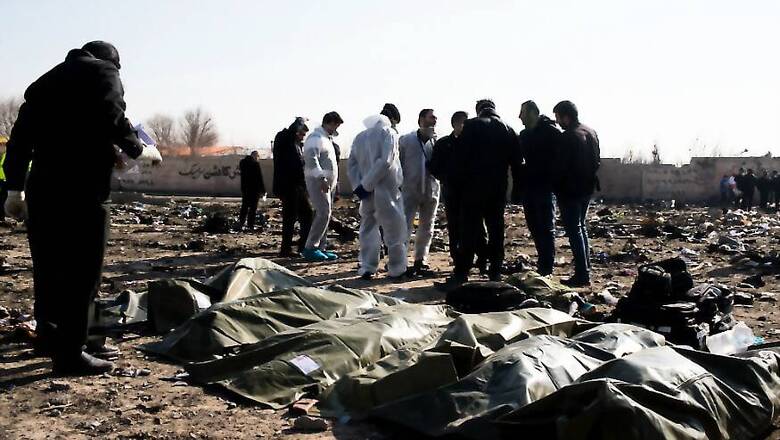Engine Failure or Military Attack? Little Clarity and Many Theories After Deadly Plane Crash in Iran

views
The mood in Tehran was tense Wednesday morning when Ukraine International Flight 752 took off, bound for Kyiv. Just hours earlier, Iran had fired missiles at two bases in Iraq that house US troops, and Iranian forces were on alert for an American counterstrike.
Nothing was unusual about the plane’s takeoff and ascent, according to preliminary satellite data. But minutes into the flight, the Boeing 737 was engulfed in flames as it plunged to the ground, killing at least 176 people on board.
In the best of circumstances, determining the cause of an international plane crash can take a year or more of difficult investigative work and involve investigators from multiple governments. Resolving what happened over the skies of Tehran may prove even more complicated given the tensions between Iran, where the plane went down, and the United States, where it was built by Boeing, a company in the midst of crisis after two earlier deadly accidents involving another 737 model.
The immediate aftermath of the crash brought confusing and contradictory statements from Ukraine and Iran. Ukraine’s embassy in Iran initially issued a statement ruling out terrorism or a rocket attack. But the statement was later removed from the embassy’s website and replaced with one saying it was too early to draw any conclusions.
“All possible versions of what occurred must be examined,” President Volodymyr Zelenskiy of Ukraine said in a Facebook post, adding that Ukrainian experts would travel to Tehran to investigate and recover the bodies of Ukrainians.
The uncertainty could also ripple through the aviation industry, which relies heavily on the 737-NG for commercial travel. And for Boeing, the crash is the latest in a series of devastating events that have roiled the company since the first 737 Max disaster in Indonesia in late 2018.
The crash’s timing raised immediate suspicions. Iran fired at US forces early Wednesday in retaliation for an airstrike Friday that killed a top Iranian general and the leader of Iran-backed Iraqi militias — the latest in a long sequence of escalations.
Investigators should put consideration of an attack “at the top of their agenda,” said Peter Goelz, a former managing director of the National Transportation Safety Board.
On Tuesday, hours before the crash, the Federal Aviation Administration barred American airliners from flying over Iran, citing a risk that commercial planes would be mistaken for military aircraft. Several non-American carriers rerouted flights Wednesday to avoid Iraq and Iran, according to Flightradar24. In 2014, early in the war in eastern Ukraine between government forces and Russia-backed separatists, a Russian missile shot down Malaysia Airlines Flight 17, killing 298 people.
A spokesman for Iran’s armed forces, Abolfazl Shekarchi, said the crash was not a result of any military action.
“They are spreading propaganda that the Ukrainian flight was targeted,” Iranian news media quoted Shekarchi as saying. “This is ridiculous. Most of the passengers on this flight were our valued young Iranian men and women. Whatever we do, we do it for the protection and defense of our country and our people.”
Typically, the country where a crash occurs leads an investigation, and includes officials from the country where the plane was produced, as well as countries where the victims were from. With the United States and Iran engaged in an escalating, violent conflict, it was immediately apparent cooperation could be fraught.
The flight data recorders, or black boxes, were recovered from the crash site, and are usually sent to the plane’s maker for analysis. However, the head of Iran’s Civil Aviation Organization, Ali Abedzadeh, told the semiofficial Mehr News Agency that Iran would not send the recorders from the Ukraine International Airlines flight to Boeing.
“We will not give the black box to the manufacturer and the Americans,” Mehr quoted him as saying. Ukrainian officials, he said, would be involved in Iran’s investigation of the crash.
However, the airline promised a full investigation, involving officials from Ukraine, Iran and Boeing. Zelenskiy said that he had ordered Ukraine’s prosecutor general to open a criminal investigation into the crash and that the country’s entire civil aviation fleet would be checked.
The 737 left Imam Khomeini International Airport in Tehran at 6:12 a.m. Wednesday. There were 176 people aboard, including nine crew members, according to the airline, which released the names of the dead. Iranian authorities listed 177, while some Iranian news organizations cited other figures.
The plane had reached an altitude of almost 8,000 feet and a speed of more than 300 mph, according to Flightradar24, which tracks aircraft by their radio signals. Two to three minutes after takeoff, it abruptly ceased the automatic transmission of flight data, though it remained in the air for a few minutes longer. Abedzadeh said the airliner had not contacted the control tower about an emergency.
The Iranian Students News Agency, a state-run media organization, shared a video that it said showed the predawn crash, with an aircraft apparently in flames descending in the distance before a bright burst filled the sky upon impact. The New York Times identified another video that showed the crash from a different angle.
“It woke us up,” said Sajad Shirkhani, 29, who lives near the crash site. “We got out of bed and ran outside, and all of the windows on our home were broken. We ran outside, we thought we were hit by a missile, that there was a war.”
The plane crashed on agricultural land near the village of Khalaj Abad, about 10 miles northwest of where the plane’s signal was last logged by Flightradar24. The plane appears to have banked northwest and flown for several miles after its transponder stopped working.
Photos and videos from the crash site showed rescuers in a field littered with plane debris, smoldering fires and the belongings of passengers. An analysis by The Times suggests that the plane was returning to the Tehran airport when it crashed.
There was disagreement on the breakdown of the victims’ nationalities, though that may be because some passengers held dual citizenship; Iran’s tally included 147 Iranians and two Canadians, while Vadym Prystaiko, Ukraine’s minister of foreign affairs, said there were 82 Iranians and 63 Canadians.
“Our government will continue to work closely with its international partners to ensure that this crash is thoroughly investigated, and that Canadians’ questions are answered,” Justin Trudeau, Canada’s prime minister, said in a statement.
Another theory about the crash was that one of the plane’s two engines failed. Qassem Biniaz, an official at the Iranian Ministry of Roads and Urban Development, told the Islamic Republic News Agency, the government’s official news agency, that an engine on the plane caught fire and that the pilot was unable to regain control.
The Fars News Agency, a semiofficial Iranian media outlet, said in an article about the crash that “Boeing 737 passenger planes are notorious for frequent technical issues,” an apparent reference to the two crashes involving the company’s 737 Max. Later, Abedzadeh told Mehr that so far there was no evidence of technical problems.
Commercial airliners are designed to be able to fly even if one engine fails. Engine fires are fairly common on commercial jets, but rarely result in crashes. An “uncontained” engine failure, in which parts of an engine disintegrate, sometimes spraying debris that can damage or even destroy a plane, is rare. In 2018, a Southwest Airlines flight on its way from New York to Dallas experienced such an emergency, killing one person.
The plane that crashed in Iran, a 737-NG, was manufactured in 2016 and delivered directly from the factory, the airline said, and it had most recently undergone scheduled maintenance on Monday, two days before the crash. The airline offered no theories as to what might have happened and declined to comment on whether it might have been shot down, but noted that the plane was being operated by a highly trained crew.
While airlines in the former Soviet Union generally have poor safety records, Ukraine International Airlines said on its website that its safety was audited and met FAA standards for code-sharing flights with foreign partners. It had not previously experienced a fatal crash, according to a list of Ukrainian aircraft accidents compiled by the Flight Safety Foundation.
The 737-NG is one of the world’s most widely used airliners; more than 7,000 have been built since 1998, and the plane has logged more than 250 million hours of flight time and fewer than a dozen fatal accidents.
But Boeing’s engineering has come under scrutiny over the past year, after two crashes involving a different model of jet, the 737 Max. Those accidents, which were caused in part by new software on the plane, have plunged Boeing into its biggest-ever crisis. The Max has been grounded worldwide since March, and the company’s chief executive was fired last month.
As the company struggles to get a fix for the Max approved by regulators, new safety risks have recently emerged with the plane. The company may also need to assess those risks in the 737-NG family, which includes the 737-800. Boeing shares were down almost 2% Wednesday.
If the crash in Tehran turns out to be a mechanical failure, raising questions about the 737-NG, the results could be devastating for Boeing. “We are aware of the media reports out of Iran and we are gathering more information,” Boeing said in a statement.
David Gelles, Anton Troianovski and Daniel Victor c.2020 The New York Times Company



















Comments
0 comment